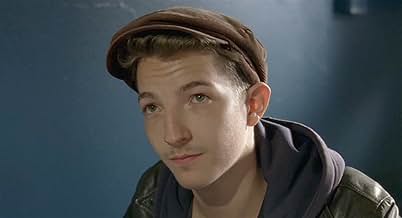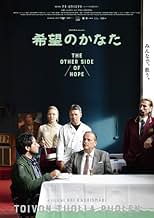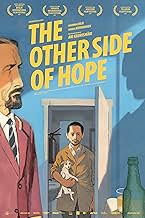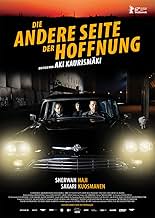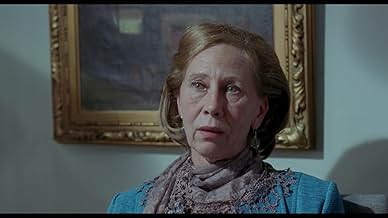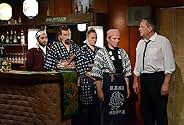VALUTAZIONE IMDb
7,2/10
14.510
LA TUA VALUTAZIONE
Un ex commesso viaggiatore che gioca a poker fa amicizia con un gruppo di rifugiati appena arrivati in Finlandia.Un ex commesso viaggiatore che gioca a poker fa amicizia con un gruppo di rifugiati appena arrivati in Finlandia.Un ex commesso viaggiatore che gioca a poker fa amicizia con un gruppo di rifugiati appena arrivati in Finlandia.
- Premi
- 8 vittorie e 24 candidature totali
Abdi Jama
- Aseman kassa
- (as Abdi alias 'Lii' Jama)
Simon Al-Bazoon
- Mazdak
- (as Simon Hussein Al-Bazoon)
Recensioni in evidenza
There's no doubt about it, Aki is back once again with a wonderful film. "The Other Side of Hope" basically tells two stories. First there's an older Finnish man who opens a small restaurant. And then there's a Syrian man who finds his way to Finland in order to start a new life. As you can probably guess, these two stories find a way to connect. And in a surprisingly good and heartwarming way.
It was interesting to see the two cultures interact with each other. I love the kindness that so many characters bring with them. The film finds an excellent way to mix humour with drama while also bringing up some relevant issues. Many of the restaurant scenes are very funny and they made me laugh. While other scenes like when a character plays music from his homeland one final time before being deported almost brought a little tear to my eye. The entire thing is still packed with all the classic Kaurismäki elements. You can almost do a drinking game; "Point out all of Aki's personal tropes". I have to say that some of my favorite parts were whenever they were trying to change the restaurant in order to fit in with the modern times. It was almost metaphorical. It's like the filmmakers themselves had never changed, but the world around them did.
Timo Salminen's cinematography is on point with excellent use of framing and colors. I admire that they still use film instead of digital. Aki is very similar to Tarantino in that subject. He has said that if they weren't able to use film he would stop making movies all together. I hope this is not his final movie. I feel like he has many stories left to tell. I'll be here waiting for whenever a new one comes out, because I never get tired of the personality that comes with his work.
It was interesting to see the two cultures interact with each other. I love the kindness that so many characters bring with them. The film finds an excellent way to mix humour with drama while also bringing up some relevant issues. Many of the restaurant scenes are very funny and they made me laugh. While other scenes like when a character plays music from his homeland one final time before being deported almost brought a little tear to my eye. The entire thing is still packed with all the classic Kaurismäki elements. You can almost do a drinking game; "Point out all of Aki's personal tropes". I have to say that some of my favorite parts were whenever they were trying to change the restaurant in order to fit in with the modern times. It was almost metaphorical. It's like the filmmakers themselves had never changed, but the world around them did.
Timo Salminen's cinematography is on point with excellent use of framing and colors. I admire that they still use film instead of digital. Aki is very similar to Tarantino in that subject. He has said that if they weren't able to use film he would stop making movies all together. I hope this is not his final movie. I feel like he has many stories left to tell. I'll be here waiting for whenever a new one comes out, because I never get tired of the personality that comes with his work.
In modern-day Helsinki, the lives of two characters are followed: Waldemar (Sakari Kuosmanen) is beginning a new life as a single man and opening a new restaurant; and Khaled (Sherwan Haji) is a refugee from Allepo, Syria seeking asylum in Finland.
This film deserves credit for taking on a subject that continues to grab headlines and personalizes it. The Finns in this movie are mostly portrayed as generous and fair-minded with a few exceptions: some are seen as idiotic government bureaucrats (an international problem), and others are seen as downright nasty thugs (a bigger international problem).
The directing style by Aki Kaurismaki is in his usual style of being deliberately austere and distant with moments of dry humour. It works well mostly but there could have been room for a few moments of deeper emotion considering the subject matter.
A shocking twist at the end does give the film some jolt but the ambiguity of the situation (which is also far-fetched to a degree) is unsatisfying. Despite this, "The Other Side of Hope" is a fine film. As it focuses mostly on Khaled, Haji comes off as a very fine anchor for the movie. - dbamateurcritic
This film deserves credit for taking on a subject that continues to grab headlines and personalizes it. The Finns in this movie are mostly portrayed as generous and fair-minded with a few exceptions: some are seen as idiotic government bureaucrats (an international problem), and others are seen as downright nasty thugs (a bigger international problem).
The directing style by Aki Kaurismaki is in his usual style of being deliberately austere and distant with moments of dry humour. It works well mostly but there could have been room for a few moments of deeper emotion considering the subject matter.
A shocking twist at the end does give the film some jolt but the ambiguity of the situation (which is also far-fetched to a degree) is unsatisfying. Despite this, "The Other Side of Hope" is a fine film. As it focuses mostly on Khaled, Haji comes off as a very fine anchor for the movie. - dbamateurcritic
Most of us have never had a 'refugee experience'. Many have read about it and some take a close interest, but usually it is something that happens to others in distant places. The confusingly labelled comedy-drama The Other Side of Hope (2017)is remarkably effective in bringing the refugee experience right into our face. Once seen, it is hard to regard it as only happening to nameless people in faraway lands.
The narrative frame has a haphazard quality about it, as if the audience has stumbled upon a vantage point from which we can see two hopeless lives randomly collide. After finally walking out on his alcoholic wife, dour Finnish salesman Waldemar (Sakari Kuosmanen) throws the sale proceeds from his business into a high-stakes poker game and makes a small fortune. After buying a run-down restaurant, he encounters Khaled (Sherwan Haji) sheltering among his rubbish bins. The Iraqi refugee had arrived in Helsinki via a coal-cargo ship while fleeing for his life. Refused refugee status and held for deportation by heartless Finnish authorities, Khaled is stateless, friendless, and homeless. Waldemar offers him work and shelter and tries to help him locate his sister who became lost while trying to escape the Syrian Civil War.
The story contains little humour. Its 'comedy-drama' label comes from totally deadpan performances that verge on absurdism, aided by a dark, almost noir filming palette. Most of the sub-titled dialogue is delivered without expression, which emphasises the heartless world into which the refugee is pushed. Dramatic situations that cry out for emotional expression are left cold, and it is this denial of the natural that most hits the viewer. For example, when the Finnish immigration official interviews Khaled for his refugee status, the honesty and sadness of his story are overwhelming yet not a trace of emotion is evident in either interviewer or interviewee. When Khaled is asked what he wants, the depth of his despair is in his words, not their expression: "I do not matter".
An element of the unexpected can add to the enjoyment of a movie, but perhaps not in this case. If you expect an entertaining comedy-drama from a nation well-known for its dark quirky humour you may be disorientated and possibly disappointed. The intention of this film is not to entertain, but to confront, inform, and engage. As global refugee problems continue unabated, The Other Side of Hope does not offer comfort or clarity, and this is reflected in its open-ended conclusion. The film's major achievement is how it makes us look directly into the face of the hopeless and hear the voice of the dispossessed. It leaves a heavy footprint.
The narrative frame has a haphazard quality about it, as if the audience has stumbled upon a vantage point from which we can see two hopeless lives randomly collide. After finally walking out on his alcoholic wife, dour Finnish salesman Waldemar (Sakari Kuosmanen) throws the sale proceeds from his business into a high-stakes poker game and makes a small fortune. After buying a run-down restaurant, he encounters Khaled (Sherwan Haji) sheltering among his rubbish bins. The Iraqi refugee had arrived in Helsinki via a coal-cargo ship while fleeing for his life. Refused refugee status and held for deportation by heartless Finnish authorities, Khaled is stateless, friendless, and homeless. Waldemar offers him work and shelter and tries to help him locate his sister who became lost while trying to escape the Syrian Civil War.
The story contains little humour. Its 'comedy-drama' label comes from totally deadpan performances that verge on absurdism, aided by a dark, almost noir filming palette. Most of the sub-titled dialogue is delivered without expression, which emphasises the heartless world into which the refugee is pushed. Dramatic situations that cry out for emotional expression are left cold, and it is this denial of the natural that most hits the viewer. For example, when the Finnish immigration official interviews Khaled for his refugee status, the honesty and sadness of his story are overwhelming yet not a trace of emotion is evident in either interviewer or interviewee. When Khaled is asked what he wants, the depth of his despair is in his words, not their expression: "I do not matter".
An element of the unexpected can add to the enjoyment of a movie, but perhaps not in this case. If you expect an entertaining comedy-drama from a nation well-known for its dark quirky humour you may be disorientated and possibly disappointed. The intention of this film is not to entertain, but to confront, inform, and engage. As global refugee problems continue unabated, The Other Side of Hope does not offer comfort or clarity, and this is reflected in its open-ended conclusion. The film's major achievement is how it makes us look directly into the face of the hopeless and hear the voice of the dispossessed. It leaves a heavy footprint.
Finnish director, Aki Kaurismäki has successfully established himself as a respectable auteur in world cinema. When it was announced after the release of Kaurismäki's last film "Le Havre" (2011) that it would be followed by another film covering similar topics and themes, audiences have been anxiously waiting for his next effort. Thus, six years later, comes "The Other Side of Hope" (2017, "Beyond Hope" literally), a film that Kaurismäki wanted to get out before it was too late. One should not be surprised by such openness about the film's political agenda given Kaurismäki's usual tendencies to do so. Nor should one be surprised by the fact that "The Other Side of Hope" is everything one could expect from Kaurismäki: an immediately recognizable film belonging to the canon of his oeuvre. While some Finnish critics have been disappointed by the lack of innovation or regeneration from Kaurismäki, they have failed to appreciate that often the best artists keep doing the "same" over and over again -- think of Ozu and Hawks, for instance, both of whom Kaurismäki adores tremendously.
Like "Le Havre", "The Other Side of Hope" also tells the story about a refugee encountering a European local. The small port town of Le Havre in France has been changed to Helsinki in Finland and the North-African refugee to a Syrian. The film follows Khaled's (played by Sherwan Haji) day- to-day activities in the red tape of immigration policy, his attempts to track down his lost sister, and his conflicts with locals as well as a parallel story about a Finnish man (played by Kaurismäki regular Sakari Kuosmanen) who leaves his wife and starts up a restaurant which eventually leads him to meet Khaled.
As mentioned above, one can recognize the film as Kaurismäki's instantly. The cinematography is often static by nature (even camera movement is rather mechanic), the acting is deadpan and the actors' delivery is laconic to the bone, there is nostalgic popular music, and mise-en-scène is characterized by vintage elements from old cars to type writers as well as classic Hollywood lighting. These cinematic means often give an ironic impression which, nonetheless, never reduces the film to a parody of itself; it manages to take itself seriously while joking around, so to speak. They also constitute an extremely economic narrative where a wordless act such as the placing of a ring on a kitchen table can say more than a thousand words. In terms of tone, Kaurismäki's film lies securely in between of tragedy and comedy, cynicism and humanism, melancholy and laughter.
In this world of deep contradictions -- not only in tone, of course, but also in, say, the co- existence of vintage elements in mise-en-scène with modern technology -- Kaurismäki's characters often find themselves to be strangers. They are strangers essentially in two senses. First, they are strangers of society; they are thugs, loners, divorced, unemployed, homeless, and refugees. Second, they are strangers of existence; their being in the world is twisted in the sense that they talk absurdly little, do not notice the absurdities of the fictive world with its contradictions, stand still for long periods of time, and can suddenly announce that they will move to Mexico City for a change of scenery without giving rise to any trace of astonishment in their interlocutors.
It seems to me that Kaurismäki's phenomenology of strangeness, if I may give it such a hasty word, has gained significant new dimensions in his contemporary cinema of global ethics. The strangers of "The Other Side of Hope" find comrades in each other without a need to announce it. They are the global working class with no nation. They are a plural bunch whose shared humanity overcomes individual differences. In a key scene echoing "Le Havre", there is a moving montage of human faces as the refugees in the reception center listen to a wordless ballad by Khaled. It is a very Kaurismäki-esque moment of cinematic personality, but here the strangeness seems to articulate heavily moral meanings in particular.
While the film is unapologetically moral and political in its message and agenda, it also comes across as a good piece of cinema with a poetry all its own (that is, the cinematic poetry of Kaurismäki's cinema in general, to be precise). Like many other films by Kaurismäki, sea is an essential element, which might represent the film's success in finding a place between poetry and politics. "The Other Side of Hope" begins with a beautiful shot of the Baltic Sea. To Peter von Bagh, a Finnish film critic and historian, all cinematic images of sea are masterful. The beauty of the sea is easily captured in a way which makes everyone a master. Yet, in order for us to care about these images, something has to happen -- either in terms of story, theme, or aesthetics -- in their appropriate contexts. In this sense, Kaurismäki delivers. The other side of hope, or its vague image in the world beyond, finds its elusive face on the surface of the sea. When Peter von Bagh passed away in 2014, Kaurismäki promised to dedicate his next film to von Bagh's memory, adding that "only if it is good enough." He did.
Like "Le Havre", "The Other Side of Hope" also tells the story about a refugee encountering a European local. The small port town of Le Havre in France has been changed to Helsinki in Finland and the North-African refugee to a Syrian. The film follows Khaled's (played by Sherwan Haji) day- to-day activities in the red tape of immigration policy, his attempts to track down his lost sister, and his conflicts with locals as well as a parallel story about a Finnish man (played by Kaurismäki regular Sakari Kuosmanen) who leaves his wife and starts up a restaurant which eventually leads him to meet Khaled.
As mentioned above, one can recognize the film as Kaurismäki's instantly. The cinematography is often static by nature (even camera movement is rather mechanic), the acting is deadpan and the actors' delivery is laconic to the bone, there is nostalgic popular music, and mise-en-scène is characterized by vintage elements from old cars to type writers as well as classic Hollywood lighting. These cinematic means often give an ironic impression which, nonetheless, never reduces the film to a parody of itself; it manages to take itself seriously while joking around, so to speak. They also constitute an extremely economic narrative where a wordless act such as the placing of a ring on a kitchen table can say more than a thousand words. In terms of tone, Kaurismäki's film lies securely in between of tragedy and comedy, cynicism and humanism, melancholy and laughter.
In this world of deep contradictions -- not only in tone, of course, but also in, say, the co- existence of vintage elements in mise-en-scène with modern technology -- Kaurismäki's characters often find themselves to be strangers. They are strangers essentially in two senses. First, they are strangers of society; they are thugs, loners, divorced, unemployed, homeless, and refugees. Second, they are strangers of existence; their being in the world is twisted in the sense that they talk absurdly little, do not notice the absurdities of the fictive world with its contradictions, stand still for long periods of time, and can suddenly announce that they will move to Mexico City for a change of scenery without giving rise to any trace of astonishment in their interlocutors.
It seems to me that Kaurismäki's phenomenology of strangeness, if I may give it such a hasty word, has gained significant new dimensions in his contemporary cinema of global ethics. The strangers of "The Other Side of Hope" find comrades in each other without a need to announce it. They are the global working class with no nation. They are a plural bunch whose shared humanity overcomes individual differences. In a key scene echoing "Le Havre", there is a moving montage of human faces as the refugees in the reception center listen to a wordless ballad by Khaled. It is a very Kaurismäki-esque moment of cinematic personality, but here the strangeness seems to articulate heavily moral meanings in particular.
While the film is unapologetically moral and political in its message and agenda, it also comes across as a good piece of cinema with a poetry all its own (that is, the cinematic poetry of Kaurismäki's cinema in general, to be precise). Like many other films by Kaurismäki, sea is an essential element, which might represent the film's success in finding a place between poetry and politics. "The Other Side of Hope" begins with a beautiful shot of the Baltic Sea. To Peter von Bagh, a Finnish film critic and historian, all cinematic images of sea are masterful. The beauty of the sea is easily captured in a way which makes everyone a master. Yet, in order for us to care about these images, something has to happen -- either in terms of story, theme, or aesthetics -- in their appropriate contexts. In this sense, Kaurismäki delivers. The other side of hope, or its vague image in the world beyond, finds its elusive face on the surface of the sea. When Peter von Bagh passed away in 2014, Kaurismäki promised to dedicate his next film to von Bagh's memory, adding that "only if it is good enough." He did.
In Aki Kaurismäki's 2016 film TOIVON TUOLLA PUOLEN ("The Other Side of Hope"), the Finnish auteur continues a theme he explored in LE HAVRE from five years earlier: refugees fleeing to Europe and forced to survive when heartless officials and some locals are against them. While that earlier film was shot in the comparatively exotic setting of the eponymous French port, TOIVON TUOLLA PUOLEN returns to Kaurismäki's familiar stomping grounds of downtown Helsinki.
The film consists of two converging plot lines. In one, the aging salesman Wikström (Sakari Kuosmanen, a longtime member of Kaurismäki's acting stable) leaves his wife, wins a lot of money in a poker game, and decides to open a restaurant. In the other, the Syrian refugee Khaled (Sherwan Haji) arrives in Helsinki after fleeing war-torn Aleppo and wandering across half of Europe, but he is worried about his sister that he got separated with along the way. Wikström and Khaled eventually meet and become friends -- or the closest thing to friends that Kaurismäki's exaggeratedly cold and morose Finns can get to each other. Before that, however, the Wikström plot line serves to inject some humour, albeit of an extremely deadpan sort, into a film that, though Khaled, explores the depressing lives of refugees who are shuffled from one center to another and forced to wait for their cases to be processed.
For three decades now, Kaurismäki has made all his films to a very distinctive template that virtually never varies. Its characters speak a minimum of dialogue to each other and show little expression on their faces. The sets are drab in colour and deliberately anachronistic, with gadgets, vehicles or clothes from the 1950s alongside computers and mobile phones from our time. At some point, a band will appear on stage playing oldies rock, blues, or Finnish tangos as the characters look on.
TOIVON TUOLLA PUOLEN doesn't stray from that template either. Still, the script has enough fresh moments to it that it will feel worthwhile even to longtime Kaurismäki films who have sat through this template many times before. Some of the humorous bits are laugh-out-loud funny, but overall this does feel like a darker film than most of the director's work. It is ultimately a choked, restrained cry of rage at the way that refugees are treated, by a Nordic society that prides itself on fairness, equality and charity. While Kaurismäki is roughly on the left politically, several of his films have attacked the Finnish welfare state for its opaque bureaucracy and its reduction of human beings to mere papers in a government file. This film continues that critique by depicting the refugees, who come from many countries but manage to band together to lend each other help, as the sort of neighborly solidarity that Kaurismäki prefers to faceless bureaucracy.
I personally wouldn't find this the best introduction to Kaurismäki. His earlier film MIES VAILLA MENNEISYYTTÄ ("The Man Without a Past") depicted with more meat on its bone a down-on-his-luck man lost among bureaucracy, while the über-idiosyncratic romantic comedy VAROJA PARATIISISSA ("Shadows in Paradise") is one of Kaurismäki's best achievements in deadpan humour. Still, TOIVON TUOLLA PUOLEN seems to tell a story universal enough to pull on everyone's heartstrings and is worth seeing.
The film consists of two converging plot lines. In one, the aging salesman Wikström (Sakari Kuosmanen, a longtime member of Kaurismäki's acting stable) leaves his wife, wins a lot of money in a poker game, and decides to open a restaurant. In the other, the Syrian refugee Khaled (Sherwan Haji) arrives in Helsinki after fleeing war-torn Aleppo and wandering across half of Europe, but he is worried about his sister that he got separated with along the way. Wikström and Khaled eventually meet and become friends -- or the closest thing to friends that Kaurismäki's exaggeratedly cold and morose Finns can get to each other. Before that, however, the Wikström plot line serves to inject some humour, albeit of an extremely deadpan sort, into a film that, though Khaled, explores the depressing lives of refugees who are shuffled from one center to another and forced to wait for their cases to be processed.
For three decades now, Kaurismäki has made all his films to a very distinctive template that virtually never varies. Its characters speak a minimum of dialogue to each other and show little expression on their faces. The sets are drab in colour and deliberately anachronistic, with gadgets, vehicles or clothes from the 1950s alongside computers and mobile phones from our time. At some point, a band will appear on stage playing oldies rock, blues, or Finnish tangos as the characters look on.
TOIVON TUOLLA PUOLEN doesn't stray from that template either. Still, the script has enough fresh moments to it that it will feel worthwhile even to longtime Kaurismäki films who have sat through this template many times before. Some of the humorous bits are laugh-out-loud funny, but overall this does feel like a darker film than most of the director's work. It is ultimately a choked, restrained cry of rage at the way that refugees are treated, by a Nordic society that prides itself on fairness, equality and charity. While Kaurismäki is roughly on the left politically, several of his films have attacked the Finnish welfare state for its opaque bureaucracy and its reduction of human beings to mere papers in a government file. This film continues that critique by depicting the refugees, who come from many countries but manage to band together to lend each other help, as the sort of neighborly solidarity that Kaurismäki prefers to faceless bureaucracy.
I personally wouldn't find this the best introduction to Kaurismäki. His earlier film MIES VAILLA MENNEISYYTTÄ ("The Man Without a Past") depicted with more meat on its bone a down-on-his-luck man lost among bureaucracy, while the über-idiosyncratic romantic comedy VAROJA PARATIISISSA ("Shadows in Paradise") is one of Kaurismäki's best achievements in deadpan humour. Still, TOIVON TUOLLA PUOLEN seems to tell a story universal enough to pull on everyone's heartstrings and is worth seeing.
Lo sapevi?
- QuizThe actors playing siblings Khaled and Miriam are real-life siblings.
- ConnessioniFeatured in Ismo Haavisto One Man Band: Midnight Man (2017)
- Colonne sonoreOi mutsi, mutsi
Written and performed by Tuomari Nurmio
I più visti
Accedi per valutare e creare un elenco di titoli salvati per ottenere consigli personalizzati
- How long is The Other Side of Hope?Powered by Alexa
Dettagli
- Data di uscita
- Paesi di origine
- Siti ufficiali
- Lingue
- Celebre anche come
- The Other Side of Hope
- Luoghi delle riprese
- Helsinki, Finlandia(The city)
- Aziende produttrici
- Vedi altri crediti dell’azienda su IMDbPro
Botteghino
- Budget
- 1.600.000 € (previsto)
- Lordo Stati Uniti e Canada
- 183.943 USD
- Fine settimana di apertura Stati Uniti e Canada
- 15.495 USD
- 3 dic 2017
- Lordo in tutto il mondo
- 4.282.973 USD
- Tempo di esecuzione
- 1h 40min(100 min)
- Colore
- Mix di suoni
- Proporzioni
- 1.85 : 1
Contribuisci a questa pagina
Suggerisci una modifica o aggiungi i contenuti mancanti


